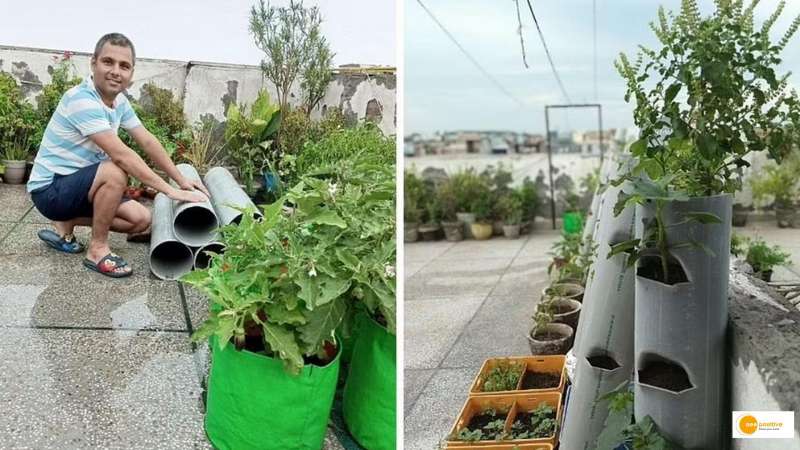

Mithilesh Kumar Singh, from the Uttar Pradesh village of Ballia, spent most of his childhood playing outside and watching his family work in the fields. But everything changed when he moved to Azamgarh for school and then to Delhi for work.
Mithilesh decided to pursue his passion for writing by working as a content writer. He has worked for a number of portals as well as a global media content company over the years. Although he was happy with his job, he recalls the capital city’s environment as monotonous and unhealthy.
The 38-year-old and his wife Vindhyavasini had a garden on their terrace. “We reside on the top level of an apartment, and we originally used the terrace to grow ornamental plants. When the pandemic started, we considered producing vegetables as well,” says Mithilesh.
Mithilesh gained a greater knowledge of farming and its practices during the pandemic. This gave him the motivation he needed to start an organic vegetable garden at home in Delhi. His goal was to produce enough food for his family’s needs while also giving away any surplus to others.
Started growing veggies in PVC pipes
Rather than using pots or grow bags, Mithilesh decided to focus on unused PVC pipes in the apartment to save space. PVC pipes are commonly inexpensive, easily accessible, and can save a significant amount of space. Furthermore, it does not necessitate a complicated setup.
Mithilesh expanded his garden in 2021 by utilising this vertical farming technique. He now grows common vegetables such as chilli, coriander, tomato, brinjal, okra, peas, bitter gourd, and others.
He also developed a gardening portal called Veg Roof. This was his first step toward establishing a farming startup. In addition, he began creating videos for his similarly named YouTube channel. He registered Veg Roof in April 2022.
“Despite the abundance of information available on several websites and channels, many individuals still find gardening to be a tiring activity. The lack of available space is a significant problem for many. I discovered that this issue is largely resolved by growing vegetables on PVC pipes. I’ve created a working project where I distribute plants, I cultivate in PVC pipes to locals. They gain an initial push and realize it is achievable in this way,” he says.
The first 18 plants of each kind were given away for free at first. Mithilesh has begun offering the same to anyone who is interested because the results were promising. On the other hand, the YouTube channel is jam-packed with videos that share advice on farming methods, how to build up a garden, and how to grow food efficiently.
Additionally, he claims that the COVID-19 period has substantially contributed to the growth of his startup by teaching people how to eat and live healthily.
“My ultimate goal is to encourage more individuals to pursue farming. I believe that this small startup would encourage everyone to grow their food,” he says.
Benefits of Using Agricultural PVC Pipes for Farmers:
1. Exhibit durability at its best
Oriplast PVC agricultural fittings and pipes have a long life. When you buy them, you also get the assurance of durability. Because these piping solutions are long-lasting, they reduce operational costs over time.
2. Cost-effective
In comparison to other solutions, PVC pipes and fittings are lightweight and, therefore, easy to install and require zero maintenance. However, just because these are light in weight, it does not mean they are weak and prone to breakage. These pipes are extremely sturdy.
3. Agriculture PVC pipe fittings can withstand rough on-site conditions
On-site conditions on agricultural farms can be harsh, rough, and tough due to all of the digging, ploughing, and everything in between. However, if you have agriculture PVC pipe fittings installed, you can breathe a sigh of relief because these piping solutions are built to withstand the harsh on-site conditions at agricultural sites.
4. Chemical resistance
PVC pipes exhibit excellent resistance to a wide range of chemical reagents and disinfectant chemicals.
5. Leak free joints
PVC pipe’s ultra-smooth surface reduces pumping costs and its leak-free joints eliminate water loss – which can be up to 40 per cent in some old-technology and corrosion-prone piping networks.


